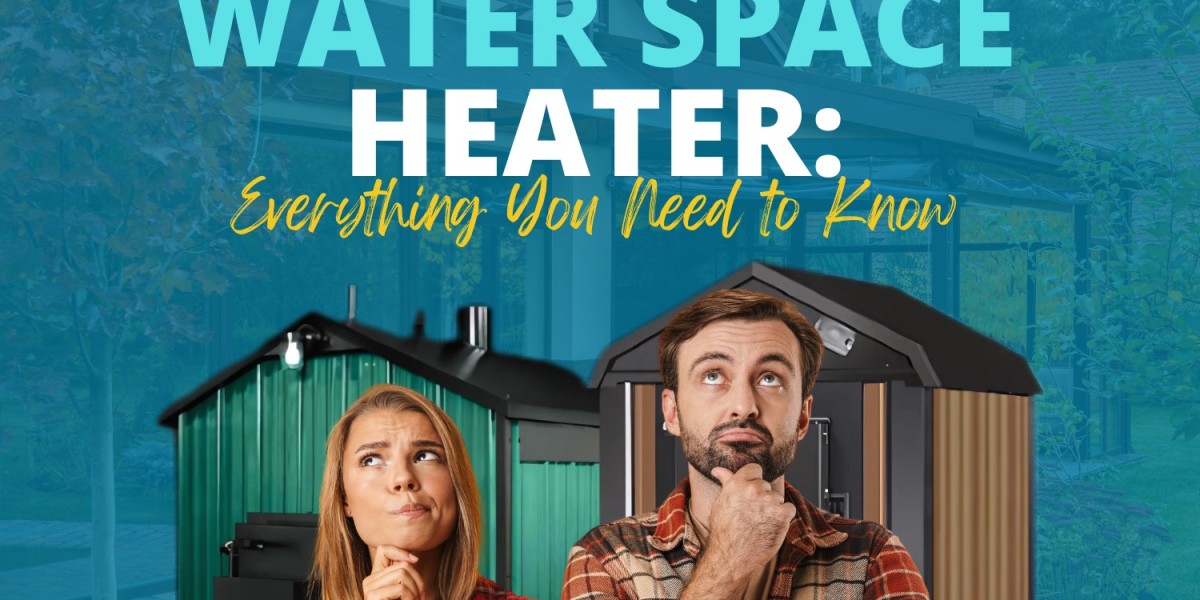This blog post will explore everything you need to know about water space heaters, from what they are to what types are there and the benefits of such heaters. These models include hydronic systems, heat pump water heaters, and combination boilers. Each method has its benefits as well as suitability to specific home environments. We will also cover the major factors to consider to determine if a water space heater is a good fit for your household. Energy efficiency, installation requirements, maintenance needs, safety, and more. Knowing about these factors gives you a better picture regarding whether this groundbreaking heating solution fits your needs and wants at home and can allow you to stay warm and cozy all year long while being an environmentally friendly and wallet-friendly solution.
Check out the Outdoor Boiler Circulation Pump.
What is a Water Space Heater?
This appliance is primarily designed for heating water for normal household use and secondarily for heating water in space areas, making it a water space heater. Unlike conventional systems that rely on distinct appliances to heat water and space, a water space heater provides integrated capability within end-to-end equipment. They accomplish this by using technologies like hydronic heating, where hot water passes through radiators or floor pipes it's under to heat the space, or heat pump technology, where heat is procured from the air or ground to heat both water and spaces at the same time. This two-in-one design makes an energy- and space-saving option for the homes of today.
Integrated systems are a popular choice for homeowners aiming to reduce both energy use and utility bills. These systems integrate essential functions, saving the cost of separate devices as well as the costs of installation and operation. For water heating, hydronic systems, heat pump water heaters, and combination boilers, for example, address varying home footprints and energy requirements. This makes them an easy solution for environmentally responsible households looking to add more comfort while reducing their carbon footprint.
Types of Water Space Heaters
Water space heaters come in various types, each suited to different needs and home setups. Below is an overview of the three most common types:
Hydronic Systems: These systems circulate heated water through radiators or underfloor pipes for consistent, energy-efficient home heating. Ideal for larger homes or homes where a hydronic system already exists (in the case of heated floors, for example), they provide steady, comfortable warmth.
Heat Pump Water Heaters: Used to transfer heat from the air or ground to heat water for general use or space heating with increased efficiency. Highly energy and environmentally friendly but not in the cold weather performance, best suited for homes in warm parts of the world.
Combination Boilers: Combi boilers heat water and central heating in demand, which means you do not need a separate storage tank. Space-saving design The compact units of combination boilers make them cleaner and more aesthetically pleasing than traditional systems, so they can fit into smaller homes or apartments and still provide efficient heating and hot water.
Benefits of Water Space Heaters
- Energy Efficiency
Water space heaters are designed to be highly energy-efficient, often consuming less energy compared to using separate systems for water and space heating. Heat pumps and hydronic systems, for example, transfer heat rather than generate it, meaning energy use drops significantly. For instance, heat pump water heaters consume up to 60% less electricity than your old high-consumption electric water heater, which saves a fortune on utility invoices. This proficiency not only saves homeowners money but also reduces their carbon footprint. - Cost Savings
By combining two essential functions—water heating and space heating—into one appliance, water space heaters reduce installation and operational costs over time. For the homeowner, they save money with no need for them to have two separate systems and their maintenance cost. Several energy-efficient modes are also available for different government rebates, tax credits, or benefits that help amortize the initial investment. - Eco-Friendly Design
Many water space heaters utilize renewable energy sources or advanced technologies, such as solar panels or heat pumps, to minimize environmental impact. These systems may produce less greenhouse gas pollution than conventional heating systems and are becoming more common among homeowners who hope to power their heating systems with less reliance on fossil fuels. - Enhanced Comfort
Water space heaters provide consistent and even heat distribution throughout the home without the dryness often caused by traditional forced-air systems. Hydronic systems, specifically, circulate heated water through pipes in radiators or under the floor, providing a nice, even warmth. This helps to eliminate cold spots and improves indoor comfort.
Key Considerations Before Buying a Water Space Heater
When purchasing a water space heater, several factors must be evaluated to ensure the system meets your home's needs efficiently and safely. Below are the key considerations:
Home Size and Layout
The size and layout of your home play a crucial role in determining the right water space heater. Make sure the system can produce sufficient heat for your home and hot water for domestic use. A higher-capacity system, or a system with a strong recovery rate, will be needed for larger homes and multi-bath homes where simultaneous use occurs.
Fuel Type
Water space heaters are available in electric, gas, or hybrid models. Your decision should be based on which fuel type is available in your region and which one is cheaper. Gas systems tend to be less expensive to run, while electric systems may be better if there isn’t natural gas available in your area. Systems like heat pumps are efficient in terms of energy use , but their best environmental performance may require particular weather.
Installation Requirements
Some water space heaters may necessitate modifications to your home’s plumbing, electrical systems, or ventilation. Gas-powered models, for instance, must be properly vented, while heat pumps need enough space for airflow. Just be sure to account for these installation needs and costs before you buy.
Maintenance Needs
Regular maintenance is essential for ensuring the efficiency and longevity of your water space heater. Some work, like descaling, tank flushing, or filter cleaning, are periodic tasks. Pick a model based on how willing and able you are to keep it running or whether you want to pay someone else to do the work.
Check out the Outdoor Boiler Supplies and Tools.
Safety Features
Safety should be a top priority when selecting a water space heater. Seek out units with overheat protection, automatic shut-off attributes, and carbon monoxide detectors (for gas systems). These features prevent accidents and contribute to safe operation in your home.
Common Applications of Water Space Heaters
Water space heaters are versatile appliances that cater to a variety of needs and environments. Here are some common applications where they prove particularly beneficial:
Residential Homes: On the new side for residential homes, particularly in the case of tight spacing, water space heaters provide a streamlined dual-purpose resolution. They integrate water heating with space heating in one unit, making them a great option for smaller homes or apartments where space is a premium. This integration minimizes some of the clutter associated with home gadgets and improves the overall aesthetic of the environment.
Energy-Conscious Homeowners: For homeowners who are budget-conscious and have an awareness of all costs (high monthly utility bills), water space heaters offer an attractive benefit. Most of these systems are energy-efficient, using less energy than separate water and space heaters. Lower utility expenses may save homeowners from going greener.
Areas Without Central Heating: Water space heaters are a suitable substitute for houses in areas where central heating systems cannot be established or where it is impractical. They are point-of-use heaters that can be placed in different homes or rooms, so the unit does not need extensive infrastructure. They are ideal for rural areas and for older properties with no existing central heating or where installing a complete central heating system would be impossible.
Conclusion
As colder weather approaches, a comfortable and warm home is essential. Water space heaters are a contemporary solution, combining hot water generation and room heating into a high-performance device. These products often use hydronic or heat pump systems to distribute heat evenly, making them a top option for energy-conscious homeowners who want to increase comfort in their homes. Hydronic systems, heat pump types, and combination boilers offer water space heaters adaptability to various living environments and climatic scenarios.
There are a lot of benefits to using water space heaters. They also tend to be more energy-efficient compared to separate appliances, which can translate to cost savings over time. Most models are eco-friendly, using sustainable resources or advanced technology to minimize their environmental impact. What’s more, they provide constant warmth throughout the home instead of the dryness often associated with traditional heaters, making interiors cozier. It’s vital to consider aspects like home dimensions, fuel choice, setup needs, and safety precautions before making a purchase. Weighing these factors helps homeowners determine if a water space heater aligns with their specific requirements, ensuring they can stay toasty and conserve resources efficiently.
FAQs
- What is a space water heater?
Indirect water heaters use a home’s space heating system to heat water and are sometimes called integrated or combination systems.
- What is a space heater used for?
Space heaters are designed to be used in tandem with your home’s central heating system (if that’s gas, electric, solar, etc.). There is plenty of heat with them because they are easy to carry and provide an additional temperature increase that warms up the air in the room.
- What is a water heater used for?
They raise the temperature of water that goes into kitchen sinks, bathroom showers, or anywhere else hot water might be desired. Electric water heaters heat water with resistor elements that are powered by electricity.



